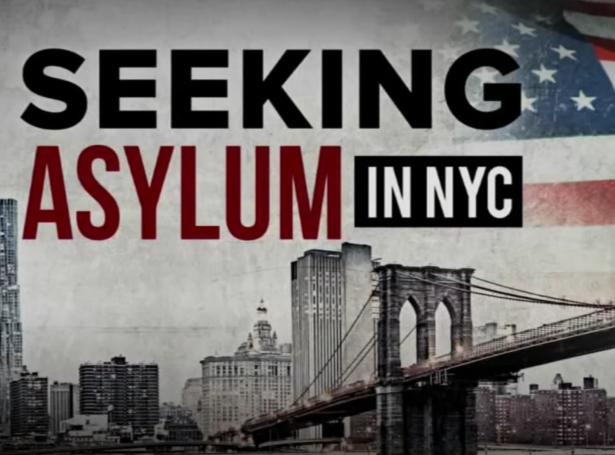As the 11 p.m. curfew approached at Floyd Bennett Field on Tuesday, the former airfield turned shelter was quietly bustling. People returning on foot to the tent complex used the light of their phones to dodge puddles, while others unloaded cases of toilet paper and other supplies from cars idling in the parking lot near the intake tent. The rain had stopped and the winds of the night before had quieted to a low whistle, but the storm and the rapidly dropping temperatures were still most of what people wanted to talk about. “You had to be there so you could see it,” Sofía, a Peruvian migrant who is staying at the shelter with her three children, told me on her way back to the tents. Her 10-year-old daughter joined in, imitating the roar of the 50-mile-an-hour gusts that shook the walls. People were afraid. Everyone slept poorly.
Residents of the 2,000-bed shelter, which opened in November to house migrant families after the Adams administration said hotels and shelter space had hit capacity, were bracing for more long nights. The complex, four massive tents divided into private pods where families sleep on cots, is heated and fortified with ballasts that can reportedly withstand winds of nearly 70 miles an hour. But the dormitories don’t have restrooms, and so the 1,720 people currently living there are still exposed to the elements every time they need to shower or use the bathroom in portable toilets stationed nearby. After Monday’s storm, temperatures dipped below freezing.
These conditions, along with the remote location, were among the top concerns from advocates in the lead-up to the opening of the facility. The city says the complex didn’t flood on Monday (though residents have said water got into the tents), but it is located on a floodplain. And without easy access to transportation, people are left to make long treks to school, jobs, and anything else they might need. “The tents are not safe for children in any weather, and families should never have been placed at this site,” said Joshua Goldfein, a staff attorney at the Legal Aid Society, which has been a critic of the tents since they were first announced. “As the temperatures drop, the situation will become much worse.” The facility isn’t built for “anything beyond basic survival,” he added.
Which is more or less a point the administration agrees on as it functionally ends the right to shelter and advertises the poor conditions migrants can expect if they come to the city. “We need to counteract those forms of communications that are basically saying, ‘You come to the City of New York, you’re going to automatically have a job, you’re going to be in a five-star hotel,’” Adams said at a briefing in October. “We want to give people a true picture of what is here. We are at capacity.”
“No one thinks having families with children living out of Floyd Bennett Field is ideal,” Kayla Mamelak, the mayor’s deputy press secretary, said in response to a comment request. “But we are out of good options.” It feels that way. Estefanía, who is from Venezuela and also asked that I not use her last name, described the “awful sounds” of the wind and how she had pulled her 4-year-old into a tight embrace as the walls billowed: “I thought the tents were going to fly off. Everyone was out of their rooms because they were afraid.” She was returning to the site with her cousin Luis, who lives in Flatbush and had offered to drop her off. “Not even I, who lives in a building, felt safe,” Luis said of the storms. “Imagine those living in the tents. They are practically abandoned.”
But not alone. Many of the people outside the complex that night had come, like Luis, to help out — either with a ride or by dropping off food and supplies. Mutual-aid groups, including South Bronx Mutual Aid and Bushwick Ayuda Mutua, have provided warm meals and winter coats to families unable to access city coat drives for lack of an ID. Some of the people returning for curfew had even found other places to stay on Sunday after hearing the weather reports, connecting with friends, relatives, and, in some cases, complete strangers to find a warm bed for the night. Cristobal, who asked that I only use his first name, had offered a place to a family from his native Guayaquil, Ecuador, because he felt afraid for the children. He knew it likely wasn’t the last time they’d need to stay with him and that he’d be back. “The storm was difficult,” he said. “Now that the snow is coming, it will be even more difficult.” Sofía and her children were already preparing. As she walked into the intake tent, she was carrying plastic bags stuffed with thermals and warm clothing.
More articles by Luis Feliz Leon
Curbed relaunched as part of New York Magazine in 2020 with a mandate to cover cities and city life with the verve, wit, and obsessiveness of the original city magazine. Subscribe to New York here. Sign up for our newsletters and follow Curbed on Instagram, Twitter, Facebook, and LinkedIn.


Spread the word